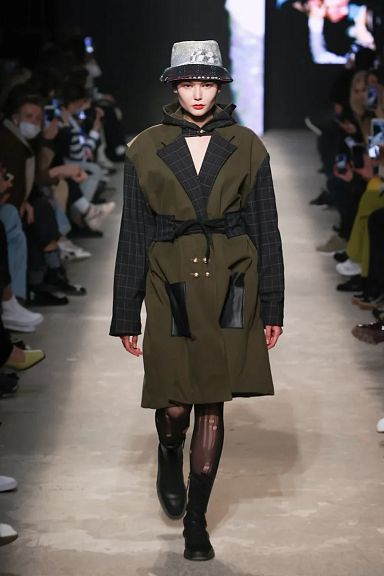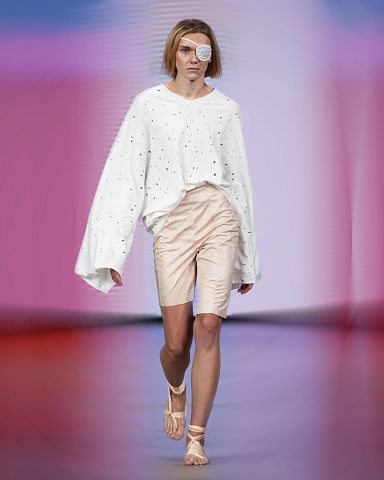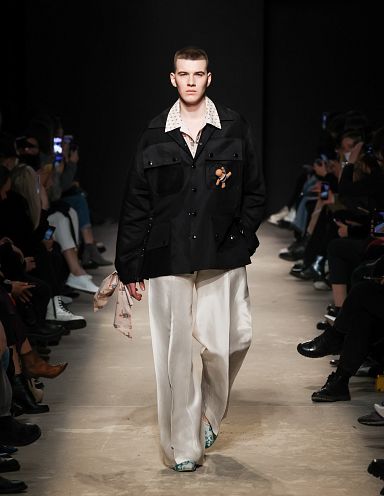The organisers of Russia Fashion Week are not trying to keep up with Paris and Milan. Their main aim is to find young talent.
The catwalks of Paris and Milan are brimming with the world's most famous names. The hallmark of -Russia Fashion Week, taking place in Moscow from 19-24 April, is the abundance of young talent.
This year, designers from 20 countries came to the Russian capital, including brands from South Korea, Mexico, the UK or Nigeria.
"We have made Moscow a hub for cheaper designer brands that are interesting in their identity, create unusual fashion, interesting content and have great potential," Alexander Shumsky, president of the National Fashion Chamber, told Euronews.
According to Shumsky, it is the new names that make Russia Fashion Week interesting. Meanwhile, each country, when organising a fashion week, aims to highlight local talent. We have selected for you four of the most interesting and unusual Russian designers.
Sasha Gapanovich: 'Layers are the basis of my clothes'
Who says winter clothes cannot be fashionable? Sasha Gapanovich's clothes have a nostalgic, vintage feel and Russian motifs. The brand's designer loves to mix colours, prints, large shapes and volumes.
Alexandra Gapanovich, designer: "I am originally from Murmansk and my brand is from the far north. I live there and have been doing it for about 20 years. My brand has existed since 2012, but it was reborn only two years ago. During the pandemic, I had a rethinking of my concept. I explored myself more deeply as a designer and, as a result, made this collection.
"The basis of my clothes is layering because we are in a climate where it is very cold and you can have many clothes on. I have very warm jumpers and tights under my dresses. This is due to the place where I was born."
Gerda Irene: 'My clothes have no gender'
Gerda Irene, the young brand of Muscovite Irina Gerda, combines vintage and modernity. "UGLY rebellion" - the creators of the brand call themselves.
The collection shown at Russia Fashion Week in Moscow was inspired by Renaissance art and the 60s.
Irina Gerda, designer of Gerda Irene: "I am self-taught. I have been sewing only with my hands for a year and a half watching various videos and masterclasses. Then I got noticed by Fashion For All Foundation in New York.
"We work with antique materials. I'm re-stitching vintage things, carpets. I also work with recycled plastic bags that I use to make hats.
"My clothes are absolutely for everyone. They have no gender and I love that. The people who wear them understand their responsibility to care for our planet.
"I'm very concerned about environmental issues. I want people to take responsibility for the environment. I am against fast fashion. My collection is one-of-a-kind, I only produce twenty-one looks. We never repeat ourselves, so people appreciate clothes more and don't clutter up the world. We have a woman in our team who makes the fabric entirely by hand. It's more eco-friendly."
o5o: 'Connecting modernity and history, I create the future'
The Russian brand o5o was founded in 2016. Designer Maria Savvina, 31, from Yakutsk, says she is inspired by traditional Yakut clothes to create pieces "that are neither past nor present, but also not future".
Savvina's work explores environmental issues and inclusivity. For MBFW, the designer created a collection with elements of zero waste and upcycling.
Maria Savvina, designer o5o: "The collection I am showing at Mercedez-Benz translates from Yakutian as 'rubbish', 'junk'. It is first and foremost nostalgia for the 2000s. Clothes as art. I took items from the 2000s that were lying in storage and recycled them into new things. By combining modernity and history, I am creating a future. There's a sense of nostalgia for something that never was. Some elements are familiar to you, but you don't perceive them as familiar things. They are still new.
"In this show, my models are exclusively queer people. My brand is inclusive. I try to choose different models, regardless of gender, physical attributes, looks, background. I don't rely only on Yakut silhouettes, but I always weave them into my clothes, as this is my background, my homeland, the place where I grew up. With my clothes, I try to convey some kind of meaning.
"My pieces are one-off and unique. Almost everything I make myself. My brand is me. It has always bothered me that the fashion industry is the second most polluting in the world. It's impossible to turn a blind eye to that. I have tried to figure out how can I make sure that after me, after my production, there is as little trash as possible? It's a challenge for me: how can I make clothes that are beautiful, but, let's say, use the remnants of clothing protrusions as decorative elements?
1377: 'Men's clothes don't distract from the person'
The brand's creator, Volgograd resident Alexandra Zhurina, says she came into the fashion world about 30 years ago, but only during the crisis caused by the pandemic was she able to rethink her work and create a successful menswear brand.
The generator for the '0.10' collection shown at Russia Fashion Week was the Soviet avant-garde of the 1920s and 30s.
Alexandra Zhurina, designer of 1377: "My formation, my character formation, my habits of consumption, my attitude towards clothes were formed in the 1980s. Back then, there was nothing total. People were just walking around in the same clothes. I remember this nightmare. That's when I decided to become a black sheep.
"And now everybody dresses the same and I don't like it. Everyone is so individual that you want to stand out from the crowd. I make men's clothes because they are more strict and do not detract from the man.
"My collection for Mercedes-Benz Fashion Week was inspired by Suprematism. The clothes are energising. It's not just a jacket, but a jacket with an artistic sense."














